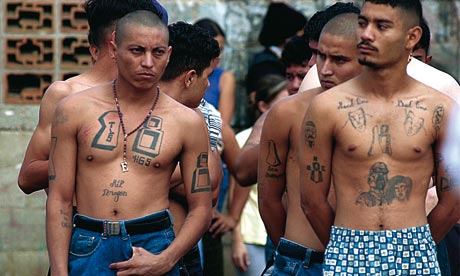
Latino men have the reputation for being detached from the church, and too many of them are caught up in destructive macho and gangster cultures.
Both Catholics and evangélicos (conservative Protestants, fundamentalist/Pentecostal) try to reach them; I have wondered who has the better success.
John Wolseth lived in Honduras and studied a barrio with gangs, Catholic Base Communities, and evangélico (Pentecostal in this barrio) churches. He describes and analyzes that environment in Jesus and the Gang: Youth Violence and Christianity in Urban Honduras.
Progressive Catholicism emphasizes community and solidarity with the poor and blames the problems of the poor on structural inequities, especially economic oppression. Catholic youth groups in the barrio follow this analysis and try to identify with the poor. But they are fearful of identifying with the poor who are gang members. Catholic youth blame gangsterism on social inequities, but do not explain why they themselves have not followed the path of the gangsters.
Pentecostals set up a harsh dichotomy between the world ruled by Satan and the church ruled by Christ. Young men who want to give up the destructive and self-destructive life of the gangs can have a conversion experience and dedicate themselves to a new life, totally rejecting the old one and separating themselves from it. They have to change their lives to convince both the church and their old gangs that they are cristianos. If a man leaves a gang, he is killed by the gang, unless he becomes a cristiano. Gangs usually let Pentecostal former gang members alone, if the former members demonstrate that their lives have really changed. Perhaps it is from superstitious motives, but at least the gangs let them go.
Catholics, with their rhetoric of solidarity, do not offer gang members the opportunity for a clean break that Pentecostals offer. Catholics blame society for individual problems; Pentecostals stress individual responsibility. Wolseth blames Neoliberalism and American interference for most of Honduras’ problems (and therefore agrees with progressive Catholics), but admits that Pentecostals help some individuals escape from the most destructive consequences of broader social problems.
Perhaps in Latin cultures, Catholics cannot do this. Catholicism and the culture are so entwined that becoming a fervent Catholic does not offer the same sort of break that gangsters need. Pentecostals, as they reject both destructive machismo and most specifically Catholic practices – mass, statues, procession, rote prayers – are foreign to the general Catholic-based culture and therefore can offer gangsters the clean break. (This is my analysis)
The same dynamic seems to be at work with the older married men that Elizabeth Brusco describes in The Reformation of Machismo: Evangelical Conversion and Gender in Columbia. The general culture includes both machismo and Catholicism. When men become evangélico, they reject both Catholicism and machismo. They follow a biblical pattern which makes men responsible heads of household. Catholics of course would like men to abandon machismo and become responsible husbands and fathers, but they do not seem to be able to offer the clean break that men need.
When Catholic families get some money, the first thing they buy is a radio; when evangelical families get some money, the first thing they buy is a dining room table. Protestantism more than Catholicism has stressed the importance of the family in the Christian life, sometimes to the extreme. I think C.S. Lewis said that sometimes Protestants set up the dichotomy of the family vs the world, rather than the kingdom of God vs the world. But on the whole, stressed modern cultures need a strong emphasis on the family, and conservative Protestantism seems to have had some success in helping people follow the biblical model.
If anyone has any observations on this, especially from what they have experienced or seen, I would appreciate them.
